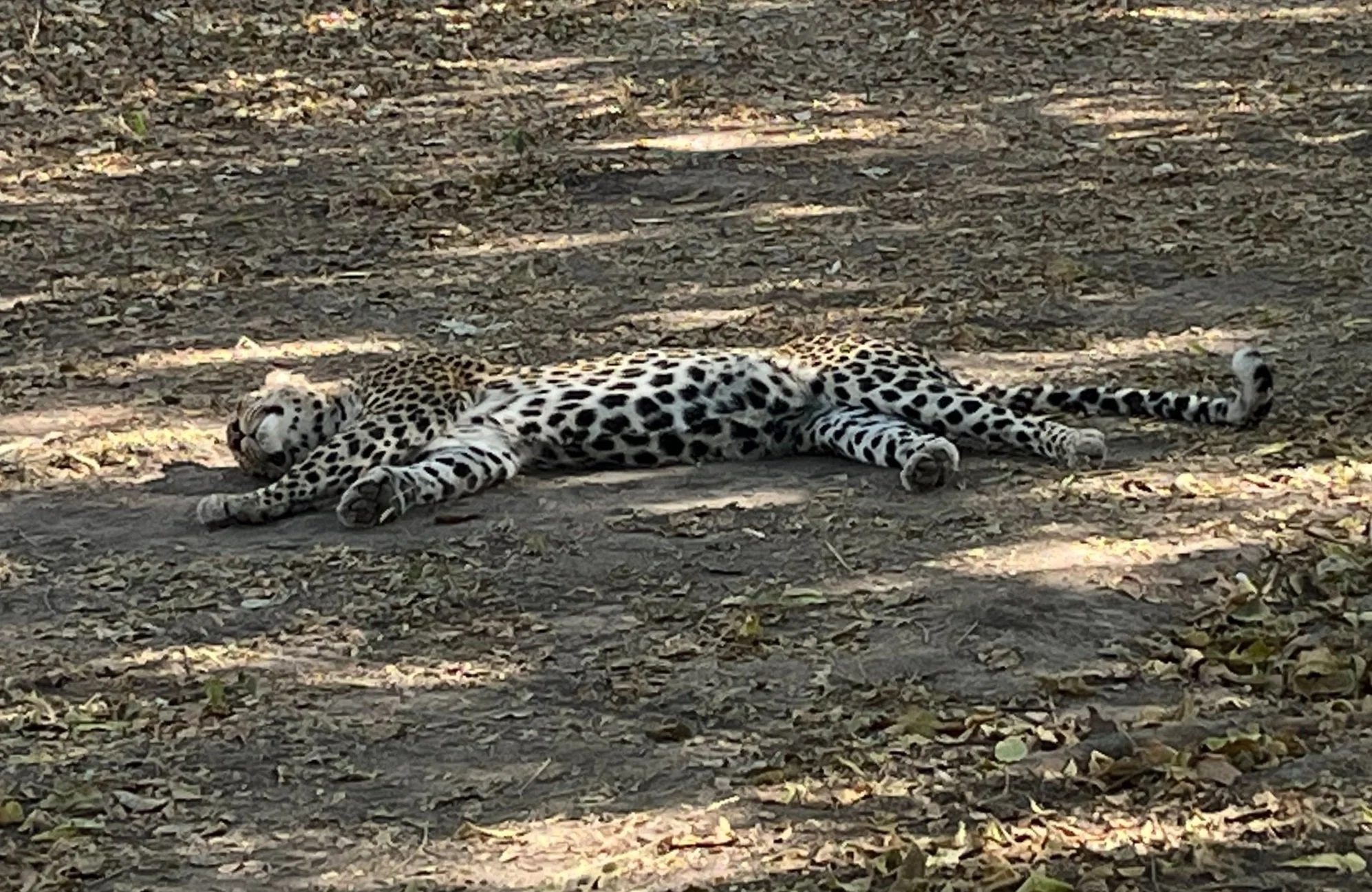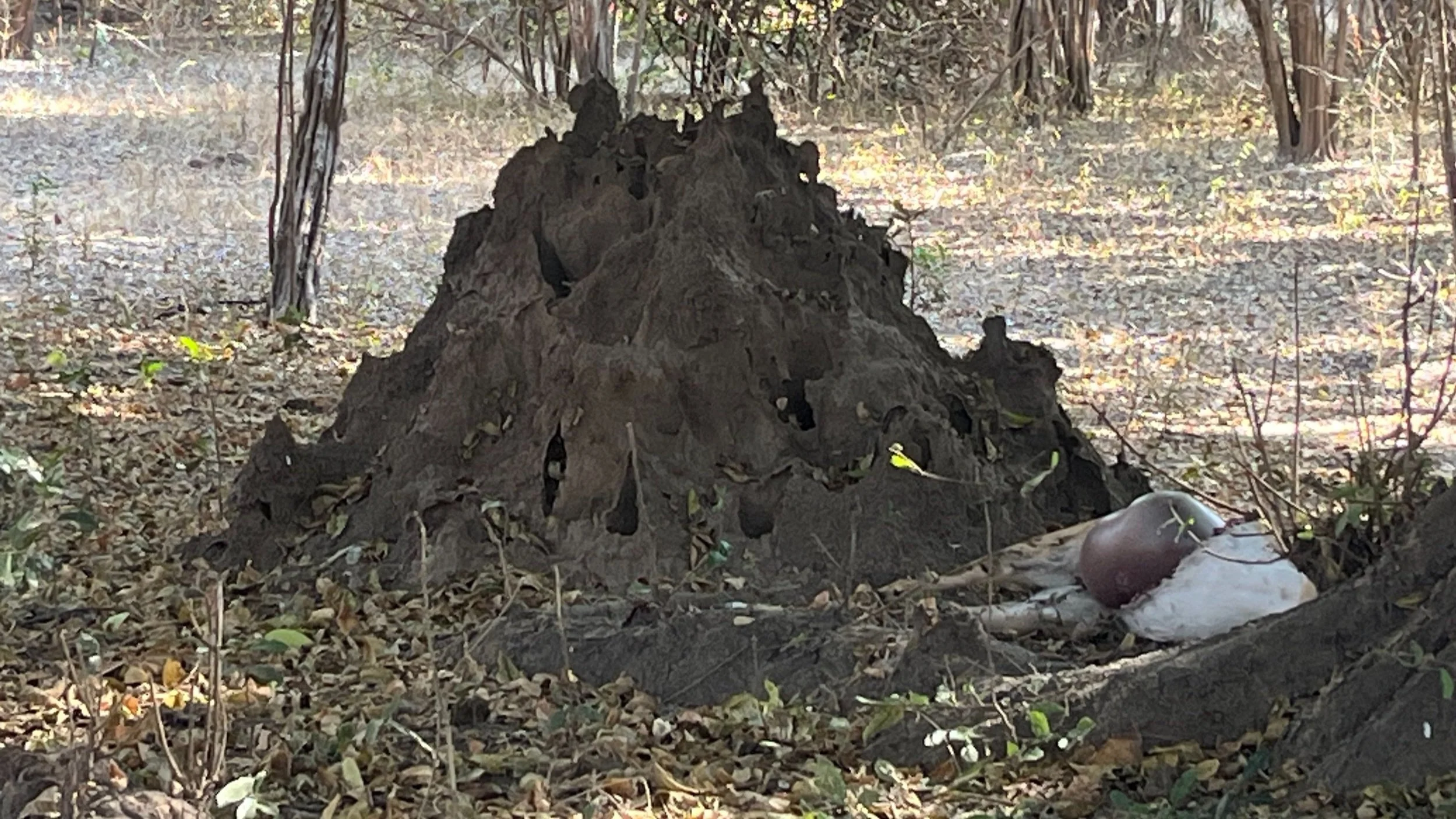All that remains…
I’ve often wondered, if I die here in Zambia, whether my body would be carried off and dismembered by ants before anyone even knew I was missing.
Death is ever present here. From the coiled up carcasses of the charming but short-lived chongololos that trundle through the undergrowth like railway carriages, to the carnivore kills prized by tourists in the national park, the fragility of life is spelled out every day.
Leopard relaxing after a kill
The remains of the meal beside a termite mound
I had been here in Mfuwe for several weeks before I realised that branches laid out in the middle of the road signaled a death nearby. As I blundered through in my 4x4, mourners would be gathering at the home of the deceased, holding vigil over the body, before moving to the burial ground within a couple of days. There is no mortuary here, so speed is of the essence in dealing with a rapidly decaying loved one. There is a local custom that says you should not die in your own house, so people frequently elect to stay in hospital or the local clinic if they know they are dying. How different that is from what I would choose when my time comes: I’ve seen the clinic.
A scrappy collection of rooms held together with hope and bent nails, there is often no power and no running water at the clinic. Children play with discarded syringes in the broken incinerator and the toilet block is only for the very brave or desperate. Ceilings are not strictly essential, one realises, to the administration of malaria tests, nor for the dispensing of antihistamines, which seems to be prescribed for just about everything, from stomach pains and nausea to aching muscles, headaches and bronchial distress. It’s a cheap drug, unlikely to cause harm, and just about the only pill readily available. I think researchers would find this a rewarding place to study the power of the placebo effect.
Against this backdrop of dereliction, Zambia has done an outstanding job of reducing HIV/AIDS through education and testing programmes, and in particular transmission of the disease from mother to child. It’s true that about 11% of the population is HIV positive today, but that’s a huge reduction from 20 years ago, when the infection rate was a staggering 19%.
In the year 2000, when we were all worrying about the millennium bug, an optimistic Zambian could look forward to making it to his 45th birthday. Reaching 50 would be an exceptional achievement. In 2025, it’s not unusual to nudge past the sixty-year threshold, with the possibility of a couple of years to enjoy the grandchildren, if you’re fortunate enough to be able to retire.
Even with increasing life expectancy, people seem to die an awful lot here. In Mfuwe, being killed by an elephant is not as unusual as you might hope. Local people have no choice but to walk or cycle home after a day’s work as the sun dips below the horizon. The gray mass of an elephant blends in perfectly with the shadows of the bush and before you know it, you’ve stumbled into something heavier than your average car. If there’s one thing elephants don’t appreciate, it’s being surprised in the dark.
Fishermen risk their lives in small canoes, dodging the hippos that grumble around invisibly on the riverbed. Once tipped into the river Luangwa, fishermen are fair game for the crocodiles. Often, these brave men are drunk as they push off from the riverbank for a night’s work in utter darkness. I think I would need a little dutch courage too. And then of course, there’s malaria: you can be dead in a fortnight.
For a few years, I was a Civil Funeral Celebrant and found it immensely rewarding. My friends would ask: How can you stand it? All that death? But I wasn’t dealing with dead people, I was working with the living, providing support and meaningful ritual. Being the person that pressed the button for the coffin to slide silently out of view, I did think about my own ending. I know of someone whose final instructions were to have a life-sized cake prepared for the wake, so that mourners could literally munch their way through him, from head to toe, as they exchanged fondant memories. I think I’d be happy with a sandwich.
Moving to Zambia was partly a result of facing my own mortality; the old clichés of this is not a rehearsal and making every day matter were all whispering to me as I commuted to what felt like a pointless job - until one day I decided to make a change.
On my way home from work this week, I was lucky enough to witness an army of fire ants on the move. I paused to wonder at the orderly line flowing out of one hole in the ground and disappearing into another. I was told it had been going like this non-stop for six hours. These little darlings are not to be trifled with. No point reaching for a slipper to swipe at them– they will just keep on coming in their millions. And they sting. You have to get out of the way, and take your pets with you.
I’m struck by the perfection of the clean-up service ants provide. Like a battalion of Winston Wolfs - the clean-up man played by Harvey Keitel in Pulp Fiction – they carry out their duties with resolute efficiency. No matter how grisly the scene, they arrive within the hour and start to make good. By the time the police arrive, the victim has been butchered into tiny pieces and carried off down the nearest hole.
Which is why, if I die in my sleep on a Friday evening, I’m quite sure that by the time I’m reported missing on a Monday morning, I will already be untraceable.
All that will remain are these words.

